Soviet Union timeline
- Published
A chronology of key events:
1917 April - Lenin and other revolutionaries return to Russia from Germany.
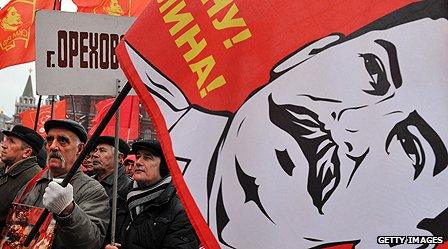
Gone but not forgotten: Many Russians still fondly remember the Soviet Union and its symbols
1917 October - Bolsheviks overthrow provisional government led by Alexander Kerensky, with workers and sailors capturing government buildings and the Winter Palace in St Petersburg, and eventually taking over Moscow.
Civil war
1918 - Treaty of Brest-Litovsk according to which Russia ceded large tracts of land to Germany; Finland, Estonia, Latvia, Lithuania, Ukraine, Georgia, Armenia and Azerbaijan proclaim their independence from Russia.
1918-20 - Civil war between Bolsheviks, or Reds, and anti-Bolsheviks, or Whites, ravages Russia. In northern Russia, British, French and US troops capture Murmansk and Archangel until 1919, while in the Russian Far East they occupy Vladivostok, which was held by the Japanese until 1922.
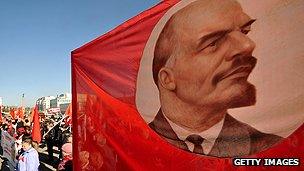
Vladimir Lenin was the main player in 1917 Bolshevik revolution
1918-21 - Policy of "war communism" enunciated, with the state taking control of the whole economy; millions of peasants in the Don region starve to death as the army confiscates grain for its own needs and the needs of urban dwellers.
1920 - War with Poland.
1921 - Peace treaty with Poland signed.
1921 - New Economic Policy ushers in a partial return to the market economy and a period of stability.
Collectivisation and purges
1922 - Union treaty formally joins Russia, Ukraine, Belarus and the Transcaucasus - which were divided in 1936 into Georgia, Armenia and Azerbaijan - into the Soviet Union.
1922 - Germany recognises the Soviet Union.
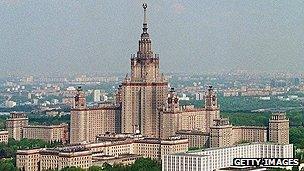
Grandiose buildings, such as the Lomonosov Moscow State University, were a feature of Soviet architecture
1924 - Soviet Union adopts constitution based on the dictatorship of the proletariat and stipulating the public ownership of land and the means of production; Lenin dies and is replaced by Joseph Stalin.
1928 - Adoption of first Five-Year Plan, with the state setting goals and priorities for the whole economy, signifies the end of the New Economic Policy.
Collectivisation of agriculture begins; numerous relatively prosperous peasants, or Kulaks, killed; millions of peasant households eliminated and their property confiscated.
1936-38 - Announcement of the discovery of a plot against Stalin's regime headed by Leon Trotsky ushers in a large-scale purge in which thousands of alleged dissidents in the armed forces, the Communist Party and the government were sentenced to death or long imprisonment.
1933 - United States recognises the Soviet Union.
1934 - Soviet Union admitted to League of Nations.
1939 August - Soviet Union and Nazi Germany conclude a non-aggression pact; Germany invades Poland, triggering World War II.
1939 September - Soviet troops enter Poland, which is then divided between Germany and the USSR.
1939-40 - Russian-Finnish war, which ends with Finland ceding territory to the USSR - the present Russian constituent republic of Karelia.
World War II and its aftermath
1940 - Soviet troops occupy Lithuania, Latvia and Estonia, which are then incorporated into the USSR; Romania cedes Bessarabia and North Bukovina to the USSR which declares the Moldavian Soviet Socialist Republic - the present independent republic of Moldova.
1941 April - Soviet Union and Japan sign a non-aggression pact.
1941 June - Germany invades the USSR and by the end of the year occupies Belarus and most of Ukraine, surrounds Leningrad (now called St Petersburg). Although a Soviet counter-offensive saves Moscow, by June 1942 the Germans were at the gates of Stalingrad (now called Volgograd) and close to the Caucasus oil fields.
1943 - Germans fail to take Stalingrad; Soviet troops launch a general counter-offensive which eventually culminates in the capture of Berlin in May 1945.
1945 - Soviet Union and the Allies reach understanding on postwar spheres of influence in Europe during the Yalta and Postdam summit conferences.
1945 August - Soviet Union declares war on Japan, eventually annexing the southern half of Sakhalin and the Kuril islands.
1948-49 - Berlin blockade: Soviet Union fails to prevent supplies from reaching the sectors of Berlin occupied by Western forces.
1949 - Soviet Union explodes its first atomic device; recognises the Communist government in China.
1950 - Soviet Union and China sign 30-year alliance treaty.
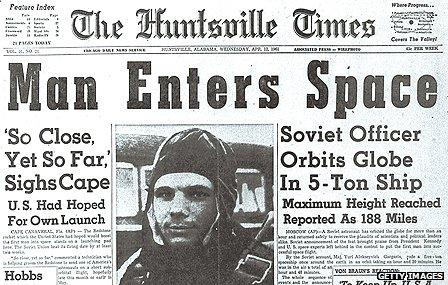
The Soviet Union set the pace in the space race by putting a man into orbit
1950-53 - Outbreak of Korean war sees relations between the Soviet Union and the West deteriorate markedly.
1953 March - Stalin dies and is succeeded by Georgi Malenkov as prime minister and by Nikita Khrushchev as first secretary of the Central Committee of the Communist Party.
1953 - Soviet Union explodes its first hydrogen bomb.
1955 - Nikolay Bulganin replaces Malenkov as prime minister.
1955 - Warsaw Treaty Organisation, or Warsaw Pact, set up.
1956 - Soviet troops help crush uprising in Hungary.
Post-Stalin thaw
1956 February - Khrushchev makes a secret speech to the 20th Communist Party congress denouncing Stalin's dictatorial rule and cult of personality.
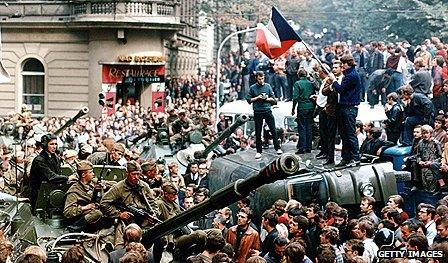
Civilians in Czechoslovakia show their defiance of Soviet authority, but their Prague Spring was soon crushed
1957 - First-ever artificial earth satellite, Sputnik, orbits the earth.
1958 - Khrushchev becomes prime minister - in addition to Communist Party chief - after dismissing Bulganin.
Late 1950s - China falls out with the Soviet Union over Moscow's policy of peaceful coexistence with the West.
1960 - Soviet Union shoots down US spy plane U-2 over Soviet territory.
1961 - Yuri Gagarin makes the first manned orbital flight.
1962 - Cuban missile crisis erupts over presence of Soviet missiles in Cuba.
1963 - Soviet Union joins the US and Britain in signing a treaty banning atmospheric nuclear tests; US-Soviet "hot line" set up.
The Brezhnev era
1964 - Khrushchev is replaced as first secretary of the Communist Party by Leonid Brezhnev; Aleksey Kosygin becomes prime minister.
1968 - Soviet and Warsaw Pact troops invade Czechoslovakia to stem a trend towards liberalisation; "Brezhnev doctrine" enunciated, giving communist countries the right to intervene in other communist states whose policies threatened the international communist movement.
1969 - Soviet and Chinese troops clash across the border.
1972 - Soviet Union and US sign SALT-1 arms control agreement, heralding the start of detente.
1974 - Soviet Union agrees to ease its emigration policy in return for most-favoured-nation trade status with the US.
1977 - Brezhnev elected president under new constitution.
1979 - Soviet Union and US sign SALT-2 agreement; Soviet troops invade Afghanistan, formally ending the period of detente with the West.
1980 - Kosygin is replaced as prime minister by Nikolay Tikhonov; Kosygin dies.
1982 - Brezhnev dies and is replaced by KGB chief Yuri Andropov.
1984 - Andropov dies and is replaced by Konstantin Chernenko.
Glasnost, perestroika and Chernobyl
1985 - Chernenko dies and is replaced by Mikhail Gorbachev as general secretary of the Communist Party; Andrey Gromyko becomes president. Gorbachev begins an anti-alcohol campaign and promulgates the policies of openness, or glasnost, and restructuring, or perestroika.
1986 - Chernobyl nuclear power station explodes, showering large areas in Ukraine, Belarus and beyond with radioactive material.
1987 - Soviet Union and US agree to scrap intermediate-range nuclear missiles; Boris Yeltsin dismissed as Moscow party chief for criticising slow pace of reforms.
1988 - Gorbachev replaces Gromyko as president; challenges nationalists in Kazakhstan, the Baltic republics, Armenia and Azerbaijan; special Communist Party conference agrees to allow private sector.
1989 - "Revolutions of 1989" see the toppling of Soviet-imposed communist regimes in central and eastern Europe. Events begin in Poland and continue in Hungary, East Germany, Bulgaria, Czechoslovakia and Romania. In East Germany, an unprecedented series of mass public rallies leads to the fall of the Berlin Wall on 9 November.
Elsewhere in the USSR: Soviet troops leave Afghanistan; nationalist riots put down in Georgia; Lithuanian Communist Party declares its independence from the Soviet Communist Party; first openly-contested elections for new Congress of People's Deputies, or parliament.
Death of the Soviet Union
1990 - Soviet troops sent to Azerbaijan following inter-ethnic killings between Armenians and Azeris; Communist Party votes to end one-party rule; Gorbachev opposes independence of Baltic states and imposes sanctions on Lithuania; Yeltsin elected president of the Russian Soviet Federative Socialist Republic by the latter's parliament and leaves the Soviet Communist Party.
1991 August - Senior officials, including Defence Minister Dmitry Yazov, Vice-President Gennadiy Yanayev and the heads of the Interior Ministry and the KGB detain Gorbachev at his holiday villa in Crimea, but are themselves arrested after three days; Yeltsin bans the Soviet Communist Party in Russia and seizes its assets; Yeltsin recognises the independence of the Baltic republics; Ukraine, followed by other republics, declares itself independent.
1991 September - Congress of People's Deputies votes for the dissolution of the Soviet Union.
1991 8 December - Leaders of Russia, Ukraine and Belarus sign agreement setting up Commonwealth of Independent States.
1991 25 December - Gorbachev resigns as Soviet president; US recognises independence of remaining Soviet republics.
1991 26 December - Russian government takes over offices of USSR in Russia.